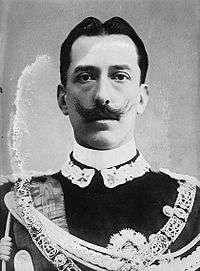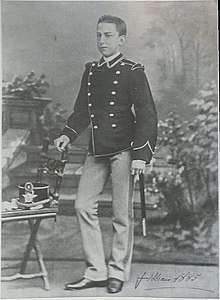Prince Vittorio Emanuele, Count of Turin
Prince Vittorio Emanuele of Savoy-Aosta, Infante of Spain, Count of Turin (24 November 1870 – 10 October 1946) was a grandchild of King Victor Emmanuel II and a member of the House of Savoy. He was a cousin of Victor Emmanuel III.
| Prince Vittorio Emanuele | |||||
|---|---|---|---|---|---|
| Count of Turin | |||||
 | |||||
| Born | 24 November 1870 Turin | ||||
| Died | 10 October 1946 (aged 75) Brussels | ||||
| |||||
| House | House of Savoy-Aosta | ||||
| Father | Amadeo I of Spain | ||||
| Mother | Maria Vittoria del Pozzo della Cisterna | ||||
Early life

Vittorio Emanuele was born in Turin just before his father Prince Amadeo of Savoy, Duke of Aosta was about to leave for Spain where he had been elected king. His mother was Maria Vittoria del Pozzo della Cisterna. With his father's accession to the Spanish throne he gained the additional title Infante of Spain.[1]
The duel
In 1897 Vittorio Emanuele challenged Prince Henri of Orléans to a duel, after Henri described, in several articles in the newspaper Le Figaro, the Italian soldiers being held captive in Ethiopia during the First Italo–Ethiopian War as cowards. The dispute was widely echoed in Italy and Europe. It was agreed on the use of the sword as weapon of choice, as the Italians thought duels with pistols, favored by the French, were worthy of betrayed husbands, not of princes of royal blood.[2]
The duel with swords, directed by the Count Leontieff and the Count Avogadro, lasting 26 minutes, took place at 5:00 am on 15 August 1897 in the Bois de Marechaux at Vaucresson, France. Vittorio Emanuele defeated Henri after five reprises.[3] Henri received a serious wound to his right abdomen, and the doctors of both parties considered the injury serious enough to put him in a state of obvious inferiority, causing the end of the duel and making Vittorio Emanuele famous in Europe.
The public response for Vittorio Emanuele in Italy was triumphant. In Turin King Umberto I welcomed him saying, "I want to be the first to congratulate you with all my heart on the example you set and the success you scored".[4]
Later years
In April 1898 Vittorio Emanuele set out on a tour of world.[5] His first stop was New York City in the United States of America. After spending a day at the Newport Country Club he presented the club with a silver cup which is presented to the winner of the annual Count of Turin golf tournament.[6] After his stay in the United States he visited China and Japan on the next leg of his world tour.[7]
Vittorio Emanuele pursued a career in the Royal Italian Army and became the Commander in Chief of the Italian Cavalry.[8] He held this position during the First World War.[9] Following the armistice he was awarded the Croix de guerre by France.[10]
Vittorio Emanuele died in Brussels four months after the proclamation of the Italian Republic. He was the last surviving son of Amadeo I.
Ancestry
| Ancestors of Prince Vittorio Emanuele, Count of Turin | |||||||||||||||||||||||||||||||||||||||||||||||||||||||||||||||||||||||||||||||||||||||||||||||||||||||||||||||||||||||||||||||||||||||||||||||||||||||||||||||||||||||||||||||||||||||||||||||||||||||||||||||||||||||||||||||||||||||||||||||||||||||||||||||||||||||||||||||||||||||||
|---|---|---|---|---|---|---|---|---|---|---|---|---|---|---|---|---|---|---|---|---|---|---|---|---|---|---|---|---|---|---|---|---|---|---|---|---|---|---|---|---|---|---|---|---|---|---|---|---|---|---|---|---|---|---|---|---|---|---|---|---|---|---|---|---|---|---|---|---|---|---|---|---|---|---|---|---|---|---|---|---|---|---|---|---|---|---|---|---|---|---|---|---|---|---|---|---|---|---|---|---|---|---|---|---|---|---|---|---|---|---|---|---|---|---|---|---|---|---|---|---|---|---|---|---|---|---|---|---|---|---|---|---|---|---|---|---|---|---|---|---|---|---|---|---|---|---|---|---|---|---|---|---|---|---|---|---|---|---|---|---|---|---|---|---|---|---|---|---|---|---|---|---|---|---|---|---|---|---|---|---|---|---|---|---|---|---|---|---|---|---|---|---|---|---|---|---|---|---|---|---|---|---|---|---|---|---|---|---|---|---|---|---|---|---|---|---|---|---|---|---|---|---|---|---|---|---|---|---|---|---|---|---|---|---|---|---|---|---|---|---|---|---|---|---|---|---|---|---|---|---|---|---|---|---|---|---|---|---|---|---|---|---|---|---|---|---|---|---|---|---|---|---|---|---|---|---|---|---|---|---|---|
| |||||||||||||||||||||||||||||||||||||||||||||||||||||||||||||||||||||||||||||||||||||||||||||||||||||||||||||||||||||||||||||||||||||||||||||||||||||||||||||||||||||||||||||||||||||||||||||||||||||||||||||||||||||||||||||||||||||||||||||||||||||||||||||||||||||||||||||||||||||||||
Honours and awards
- Supreme Knight of the Order of the Most Holy Annunciation
- Knight Grand Cross of the Order of Saints Maurice and Lazarus
- Grand Officer of the Military Order of Savoy
- Knight Grand Cross of the Order of the Crown of Italy
- Knight of the Civil Order of Savoy
- Knight of Honour and Devotion of the Sovereign Military Hospitaller Order of Malta
- Croix de guerre 1914–1918 (France)
- Knight of the Most Illustrious Order of the Royal House of Chakri (Thailand)
- Grand Cross of the Order of Carol I (Romania)
References
- Almanach de Gotha. 1872. p. 29.
- "Un duello per l'Italia". Torino. 1952.
- "Verbale dello scontro tra il Conte di Torino e il Principe Enrico d'Orléans". Torino. 1897.
- "Prince Henri in a Duel". New York Times. 1897-08-17. p. 9.
- "Count of Turin to Travel". New York Times. 1898-04-14. p. 1.
- McNamara, Kevin (2006-06-27). "U.S. Women's Open: Ike, JFK and Tiger left their mark here". The Providence Journal. Retrieved 2008-06-03.
- "The Count of Turin Here". New York Times. 1898-05-04. p. 12.
- "Praise Italy's Cavalry". New York Times. 1912-11-21. p. 5.
- "Extols The Bravery of Italian Cavalry". New York Times. 1917-11-24. p. 3.
- "France Honors Gen. Gough". New York Times. 1918-11-27. p. 10.